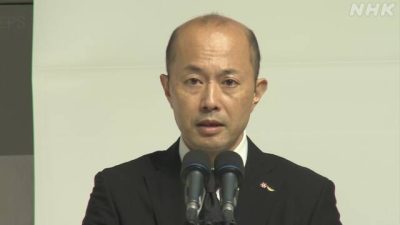Mayor of Nagasaki Calls for Nations to ‘Break Free’ from Dependence on Nuclear Deterrence

All Global Research articles can be read in 51 languages by activating the Translate Website button below the author’s name.
To receive Global Research’s Daily Newsletter (selected articles), click here.
Click the share button above to email/forward this article to your friends and colleagues. Follow us on Instagram and Twitter and subscribe to our Telegram Channel. Feel free to repost and share widely Global Research articles.
***
The mayor of Nagasaki marked the 78th anniversary of the United States dropping of an atom bomb on the city by calling today for nations across the world to “break free” from dependence on nuclear deterrence.
Three days after world’s first nuclear attack hit Hiroshima, destroying the city and killing 140,000 people, a US warplane released another atom bomb over Nagasaki that claimed 70,000 more victims. Japan surrendered on August 15, ending World War II.
The US remains the only country to have used a nuclear weapon in armed conflict.
At 11.02am, the moment the bomb exploded above the southern Japanese city, participants in today’s ceremony observed a moment of silence with the sound of a peace bell.
During his peace declaration, Nagasaki Mayor Shiro Suzuki said:
“Now is the time to show courage and make the decision to break free from dependence on nuclear deterrence.
“As long as states are dependent on nuclear deterrence, we cannot realise a world without nuclear weapons.”
Mr Suzuki expressed concern that the nuclear bombing could be forgotten as time passes and memories fade.
Survivors of the Hiroshima and Nagasaki attacks have expressed frustration about the slow progress of disarmament, while the facts about what happened and their ordeals are not yet widely shared around the world.
Mr Suzuki, whose parents were hibakusha — survivors of the Nagasaki attack — said that knowing the reality of the atomic bombings was the starting point for achieving a world without nuclear weapons.
He described the survivors’ testimonies as a true deterrence against the use of nuclear weapons.
Mr Suzuki demanded that the government of Prime Minister Fumio Kishida quickly sign and ratify the Treaty on the Prohibition of Nuclear Weapons and clearly show “Japan’s resolve to abolish nuclear weapons.”
Japan, as a key ally of Washington, is covered by the US nuclear umbrella but is rearming as the allies ramp up threats against China and North Korea.
Under its new national security strategy, Mr Kishida’s government is pushing for a military build-up focusing on its strike capability.
As of March, 113,649 survivors, whose average age is 85, are certified as hibakusha and eligible for government medical support, according to the Health and Welfare Ministry.
However, many other victims of the atomic bombing, including those known as victims of the “black rain” that fell outside the initially designated areas, have been left with no government support.
*
Note to readers: Please click the share button above. Follow us on Instagram and Twitter and subscribe to our Telegram Channel. Feel free to repost and share widely Global Research articles.
Featured image is from NHK via Teller Report

